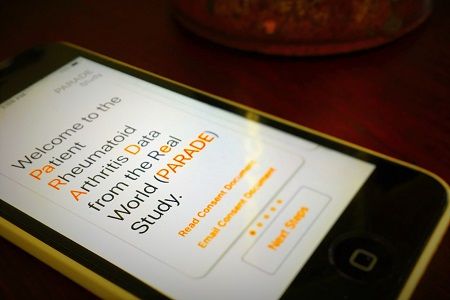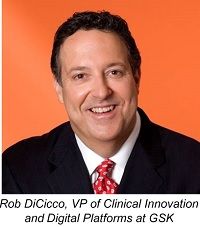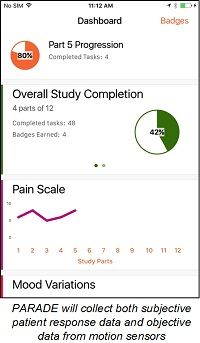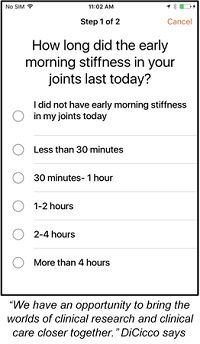Article
Real World Research: Rob DiCicco Speaks About GSK's New Mobile RA Study
Author(s):
The blistering pace of mobile innovation has opened countless doors for clinical application. Built on Apple's ResearchKit platform, GSK's PARADE app seeks to study rheumatoid arthritis patients in their daily lives.

The blistering pace of mobile innovation has opened countless doors for clinical application. Built on Apple’s ResearchKit platform, GlaxoSmithKline recently launched an app-based study called Patient Rheumatoid Arthritis Data from the Real World (PARADE). Designed to collect real-life pain and quality-of-life data from RA sufferers without requiring clinic visits, the study will track 300 patients over 3 months.
The full enrollment of 300 was reached in about two weeks, whereas finding that many participants for a localized clinical study can take as much as a year or two. Taking advantage of mobile portability and convenience, the study will produce a large volume of data, ranging from a patient's own subjective pain ratings all the way to objective motion sensor feedback, gathered by a specific wrist exercise developed for the app.
MD Magazine was able to speak with Rob DiCicco, Vice President, Clinical Innovation and Digital Platforms at GSK, about the nature of PARADE, the possibilities and limitations of mobile research, and the future of integrating mobile studies with clinical trial and responsive pharmaceutical development.

As smartphones have now become a ubiquitous part of our daily lives, Mobile health (mHealth) technology has brought about a great opportunity to develop novel endpoints which are defined as more objective, quantifiable, and potentially more sensitive than the current clinical assessment. We are leveraging these technologies to bring patients into the center of our research. We want to learn about their therapeutic goals so we can consider their insights and behaviors in a way that may improve the design of future clinical trials.
With the launch of Apple’s ResearchKit, we saw an opportunity to study the impact of a disease on patients’ day-to-day lives. Rheumatoid arthritis was a natural opportunity for us for several reasons — it’s a disease that affects patients on many levels. Patients with mobility disorders are among the most likely to benefit from mHealth, reducing the burden of traveling to clinics, and undergoing a battery of tests.
It can help us understand which benefits the patient thinks are most important with respect to the medicines we develop. It can provide a very different context about what they find most challenging about managing their disease.
Is there a screening process for study respondents, and if so, what does it entail?
Yes, after people download the app, there is a brief survey in the beginning to determine whether all the eligibility criteria are met, including the question “Have you been diagnosed with Rheumatoid Arthritis by a doctor?” In addition, there is a medical history survey that participants need to fill out. The study duration is 12 weeks during which participants are asked to rate their pain, morning stiffness, mood, and disease level each week and perform certain exercises so it’d be difficult for people to stay in the study if they don’t experience the symptoms of RA.
What advantages does this technology provide to researchers?

First and foremost, it makes the study very accessible to patients irrespective of their physical limitations by removing the demands of travel. Likewise, it engages patients who are motivated to participate in a way that conventional studies might not. In addition to the types of questionnaires that might be included in other RA studies, the sensors in the phone will also provide objective data about activity and mobility on a daily basis which would be impossible with a conventional trial. The challenge will be to synthesize and analyze these data to give us a better insight into their disease to guide our drug development programs.
What other challenges or limitations exist for remote, mobile-based research?
mHealth enabled trials are not a substitute for physician and clinical research staff, but rather a tool to improve access and deliver a better picture of disease burden along with the risks and benefits associated with new treatments. Therefore, one of the main challenges will be to figure out how to integrate this technology into the clinical trials enterprise. In the example of PARADE, patient authentication will also be a challenge, but there are imperfections even in conventional trials with paper-based and electronic questionnaires. There have been some elegant studies performed utilizing Research Kit and telemedicine. Even with leveraging the technology of live video, there is still a limit to things like performing a physical exam. Health care practitioners are critical in a patient’s decision to participate in an interventional clinical trial. Hopefully, the evolution of mHealth solutions will extend the reach of investigators and make it easier for patients to participate.
Attrition due to patient preferences is something we need to account for as we move forward with mHealth. Over time, we hope to learn what patients find compelling to engage during the life of a clinical trial.
Lastly, it will be a challenge to manage the enormous volume of data generated by the device. Improving our platform capability to handle this irrespective of the operating system is part of how we need to evolve as a research organization.
Online, the release says that the study will “use iPhone sensors to collect and track common symptoms of rheumatoid arthritis.” Are there any specifics about how the sensors will be used, what kind of data will be collected, and how much of the data will be patient response (feelings, moods) as opposed to that sensor data?
Chronic joint inflammation is one of the most common symptoms of RA. One of the unique attributes of the app is that we’ll be able to monitor wrist joint function. mHealth technology provides a great opportunity to develop novel endpoints which are defined as more objective, quantifiable and potentially more sensitive than the rating scales. This could provide objective functional data to physicians along with patient symptoms to inform their decision-making.
We worked with our development collaborator, POSSIBLE Mobile, to develop a wrist exercise for the PARADE study using a custom ResearchKit active task. The task uses ResearchKit’s vibrate and sound functionalities in order to instruct the user when to begin the exercise, switch hands, and end the exercise. During the exercise, ResearchKit will collect motion data from the sensors in the device.
Does GSK consider PARADE more of a study on rheumatoid arthritis, or more of a study on the efficacy of technology like ResearchKit itself?

It is both. We anticipate that the PARADE study will demonstrate the usability and robustness of the data collection as a platform so that researchers can have confidence in the data and generate insights. We chose ResearchKit for the potential for industry-wide standardization and re-usability.
PARADE is also a true RA patient observational study in that this is a disease that affects patients on many levels. The app will collect various information on symptoms through the sensors and questionnaires, which reduces the burden of participation on patients with mobility disorders; therefore RA seemed to be a logical disease area to assess this functionality.
Analyzing the objective sensor-driven data in tandem with symptom scores may be the key which improves endpoint selection in future clinical development programs in RA and other therapy areas as well.
Overall, we hope to learn four main things:
1. Feasibility of the platform;
2. Robustness of the data;
3. Patients’ preferences and their interest to participate in this type of research; and
4. Whether or not we can improve on conventional symptom scores and rating scales to assess disease status.
The release on your website says GSK has previously “applied over 40 technologies over a range of studies” and utilized biosensors and mobile devices “for some time”-can you speak to a few of those previous studies, and how this fits into GSK’s overall research efforts?
clinical trials. These clinical studies include biosensors and mobile devices. In one study, GSK worked with McLaren Applied Technologies to use mHealth technology to collect data from 25 patients with Amyotrophic lateral sclerosis (ALS). Participants were outfitted with small, lightweight monitors near their chests to measure heart rate, as well as physical activity.
GSK also partnered with Medidata Solutions on a mHealth initiative in GSK’s Human Performance lab to build the capability to collect the large volumes of objective data that come off the biosensors in a way that is reliable, secure and analysis-ready. This technology holds the potential to provide real-time continuous insight into the health status of study participants. This initiative won the 2016 Informa CARE Award for Clinical Partnership of the Year.
Are there plans for more app-based studies like PARADE in the future?
Yes, ResearchKit has the potential for industry-wide standardization and re-usability, which is why we chose this open-source platform. We would also like to explore the potential to leverage different operating systems to make this type of research even more accessible. The PARADE study represents the 1st iteration of the mobile app-based study for GSK. We plan to refine our approach based on what we learn from this study. We do hope the industry will adopt this type of platform and share their experience openly to move the field forward.
To what extent can technology like ResearchKit change how medical research is conducted?
We believe that patients have the will and insights to improve the quality of our development programs. Mobile technology now offers the means for them to efficiently share those insights. Patients are rightly taking more control of how they access health care and how they share their data. We need to learn how to do clinical research in that environment.
We envision that these types of mobile app-based studies could complement or supplement traditional clinical trials especially because of the ability to develop new endpoints and reduce the amount of time it takes to enroll study participants. It can take anywhere between 1-3 years to fully enroll a clinical trial. In the first 48 hours of launching PARADE, we had over 100 people registered. Within 2 weeks of enrollment period, we have reached our enrollment goal of 300 patients.
If patients can participate in research in the course of their daily life, the better it is for everyone. This real-time data can give us an objective view of chronic disease daily; it’s a different picture of disease than just a snapshot taken at monthly visits in a conventional research study. It can help us understand which benefits the patient thinks are most important with respect to the medicines we develop. It can provide a very different context about what they find most challenging about managing their disease.
By making research as easy and accessible as possible for patients, we have the potential to disrupt the model for how we conduct research in the future and ultimately improve patient health. We have an opportunity to bring the worlds of clinical research and clinical care closer together.
Since 2013, we’ve been exploring the use of sensor technologies and digital channels as a means to improve the efficiency of our research, and to build the capability to improve patients’ access to
A special thanks to Anna Padula from GlaxoSmithKline for helping to facilitate this interview.




